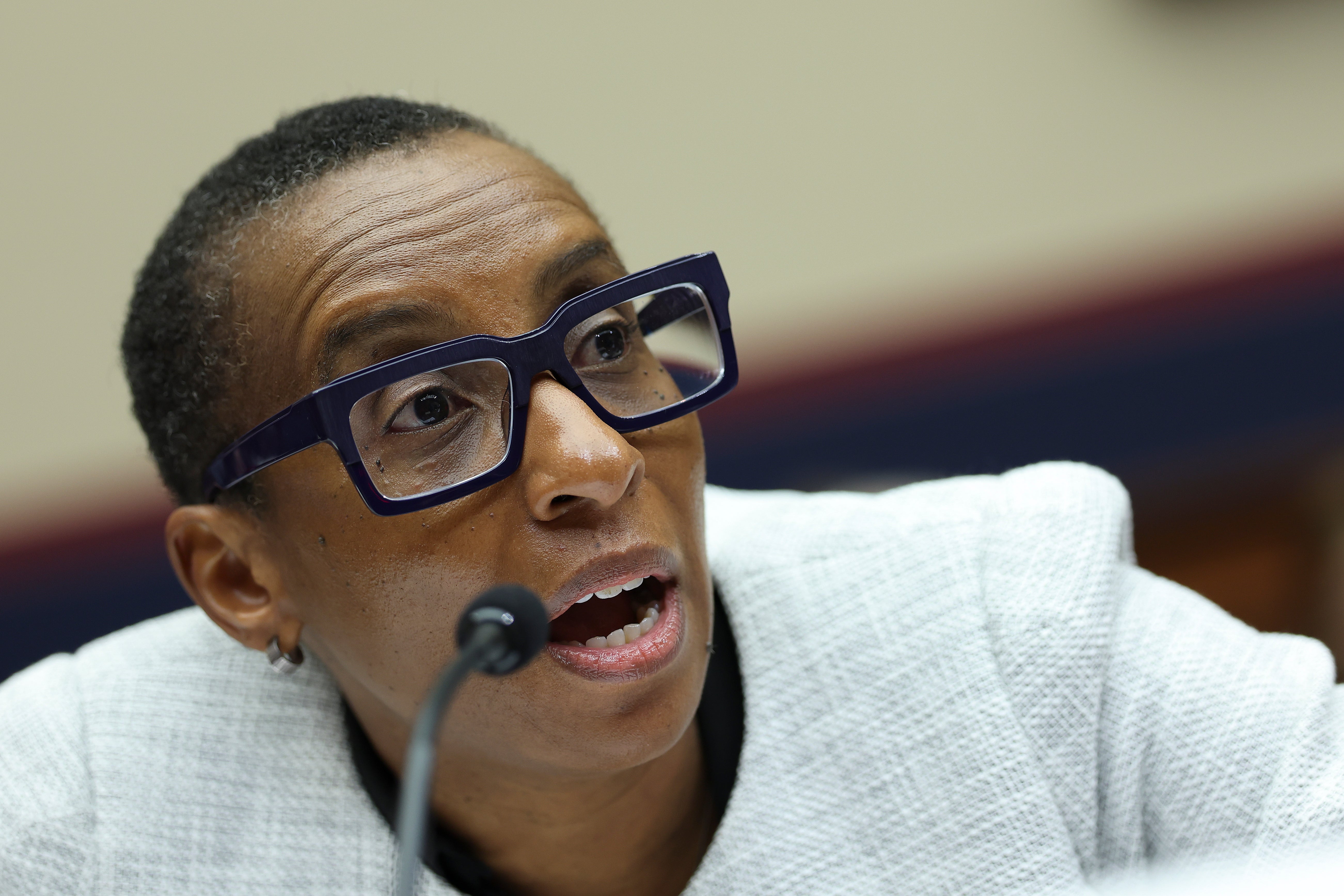Harvard defends efforts fighting antisemitism after backlash to congressional hearing
Lawmakers grilled university leaders over campuses controversies and protecting students from antisemitism in wake of 7 October Hamas attack on Israel
Harvard University has pushed back against calls for its president, Dr Claudine Gay, to resign, a day after top US university presidents were questioned in Congress about campus antisemitism and free speech.
Critics in and outside Congress allege the university leaders did not speak out forcefully against calls for violence against Jews.
“There are some who have confused a right to free expression with the idea that Harvard will condone calls for violence against Jewish students,” the Harvard president said in a statement. “Let me be clear: Calls for violence or genocide against the Jewish community, or any religious or ethnic group are vile, they have no place at Harvard, and those who threaten our Jewish students will be held to account.”
Tuesday’s hearing before the House Education and Workforce Committee included the presidents of Harvard, the University of Pennsylvania, and the Massachusetts Institute of Technology.
Clips from the daylong hearing soon went viral featuring New York Republican Elise Stefanik grilling the university leaders.
The exchanges all centred on protest chants referencing the Palestinian “intifada” and the slogan “from the river to the sea, Palestine will be free,” which Ms Stefanik interpreted as a call for genocide against Jews. The meaning of the latter phrase, which dates back decades, has a variety of interpretations, ranging from peaceful to hateful.
In a series of heated questions, the New York congresswoman asked whether students who uttered the phrase would qualify as violating the universities’ code of conduct on bullying and harassment.

Presideny Gay of Harvard said at one point in the hearing “that type of hateful speech is personally abhorrent to me,” but later emphasised that discipline would depend “on the context” and that student words need to cross over into “conduct targeted at an individual” to qualify as bullying and harassment.
“It’s targeted at Jewish students, Jewish individuals,” Rep Stefanik responded. “Do you understand your testimony is dehumanising them? Do you understand that dehumanisation is a part of antisemitism?”
The other leaders had similar answers, with President M Elizabeth Magill of the University of Pennsylvania saying it was “context-dependent” whether students could be punished for bullying and harassment for saying the phrases the New York representative identified.
President Sally Kornbluth of MIT, meanwhile, said she hadn’t heard any calls on campus for genocide.
“I’ve heard chants which can be antisemitic, depending on the context, when calling for the elimination of the Jewish people,” she said during the hearing. “That would be investigated as harassment if pervasive and severe,” she added.
The leaders, all of whom condemned antisemtism during the hearing, faced intense, bipartisan backlash following the hearing, including from the White House.
"It’s unbelievable that this needs to be said: calls for genocide are monstrous and antithetical to everything we represent as a country,” a Biden administration official said in a statement. “Any statements that advocate for the systematic murder of Jews are dangerous and revolting – and we should all stand firmly against them, on the side of human dignity and the most basic values that unite us as Americans."
Josh Shapiro, the Democratic governor of Pennsylvania, also weighed in, calling the UPenn leader’s conduct in the hearing “unacceptable.”
“It should not be hard to condemn genocide, genocide against Jews, genocide against anyone else,” he told The New York Times on Wednesday. “I’ve said many times, leaders have a responsibility to speak and act with moral clarity, and Liz Magill failed to meet that simple test.”
Conservatives also hit out at the university leaders.
“It does not depend on context,” Rep Stefanik said during the hearing after questioning Dr Gay. “The answer is yes, and this is why you should resign. These are unacceptable answers across the board.”
During Wednesday evening’s GOP primary debate, former UN ambassador Nikki Haley also railed against the university leaders, threatening colleges with losing tax exempt status if they didn’t do more to fight antisemitism.
“If this had been the KKK that was doing protests on those campuses, every one of those college presidents would have been up in arms,” she said.
Business leaders like hedge fund billionaire Bill Ackman – who has been a vocal critic of campus leadership since the war and called for vocally pro-Palestine students who signed a controversial letter at Harvard to be blacklisted – also expressed their dismay.
“They must all resign in disgrace,” he wrote of the presidents on X/Twitter. “If a CEO of one of our companies gave a similar answer, he or she would be toast within the hour. Why has antisemitism exploded on campus and around the world?”
The Independent has contacted MIT and the University of Pennsylvania for comment.
As The Independent has reported, university leaders across the country have struggled to balance the safety of Jewish and Muslim students against free expression rights amid the Israel-Hamas war, against a backdrop of rising hate crimes.
Elsewhere during the hearing, the university leaders expressed their commitment to battling hate.
“As an American, as a Jew, and as a human being, I abhor antisemitism, and my administration is combatting it actively,” President Kornbluth said during her opening statement. “Since October 7th, my campus communications have been crystal clear about the dangers of antisemitism and about the atrocity of the Hamas terror attack.”
Join our commenting forum
Join thought-provoking conversations, follow other Independent readers and see their replies
Comments
Bookmark popover
Removed from bookmarks